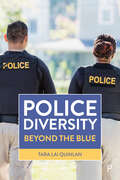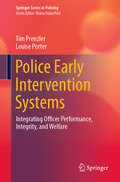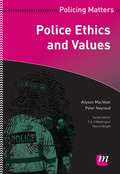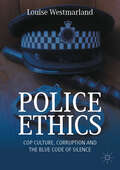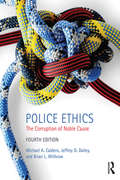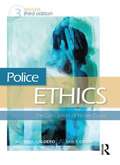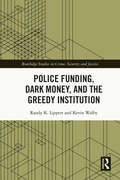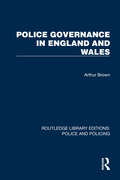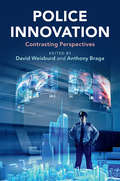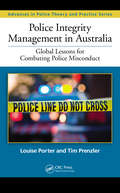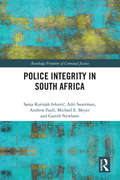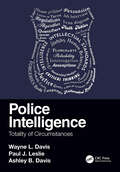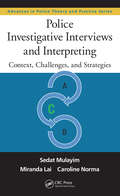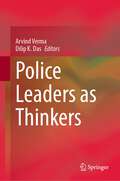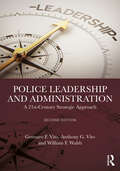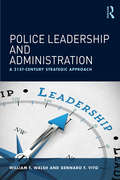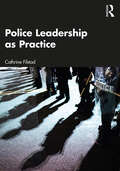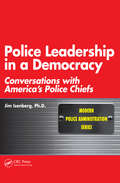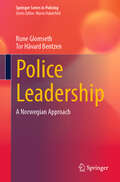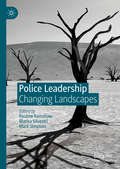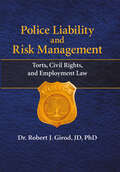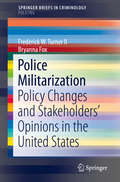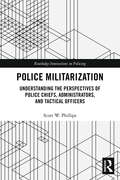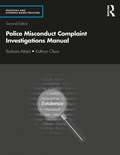- Table View
- List View
Police Diversity: Beyond the Blue
by Tara Lai QuinlanTensions between police and diverse communities in both the US and UK require innovation about ways to improve relations. While police diversity is often discussed as a potential solution, these discussions lack theoretical and empirical support. This volume presents an original discussion of race, gender, sexual orientation and class diversity and shows that police diversity can have meaningful impacts on the decision-making, outcomes and legitimacy of police forces. Drawing on theoretical and empirical research including interviews with diverse police leaders, this book examines how police diversity can help shift traditional policing cultures. It also considers obstacles to police reform, revealing how championing meaningful diversity can positively impact the lives of policed communities.
Police Early Intervention Systems: Integrating Officer Performance, Integrity, and Welfare (Springer Series in Policing)
by Tim Prenzler Louise PorterThis book documents the development of early intervention systems (EISs) internationally, and provides evidence for and against their effectiveness as a key tool to reduce police misconduct and improve the physical and psychological health of officers. Featuring practical illustrations to support textual examples, this volume offers valuable best practices for police departments and policing students.
Police Ethics and Values (Policing Matters Series)
by Peter Neyroud Allyson MacveanThis text provides an accessible, up to date and comprehensive introduction to police ethics and values for all those undertaking degrees and foundation degrees in policing and related subjects. The recent introduction of directives, legislation and Codes of Standards has demanded a more principled and professional approach to policing. This book therefore provides a clear understanding of police ethics and values and how these are understood in policy and applied in an operational setting. It discusses the range, importance and complexity of ethical issues faced by law enforcement practitioners and policy makers, introduces the key concepts of ethics, professionalism and policing, and relates these to key themes within policing.
Police Ethics: Cop Culture, Corruption and the Blue Code of Silence
by Louise Westmarland"This book is an important analysis of how police themselves define and respond to police corruption and wrongdoing. It offers special insights into this hard to research issue because it is based on using similar techniques of study on samples of police over time and in different jurisdictions, all linked by an autoethnographic account by Professor Westmarland — an internationally celebrated expert on the topic — narrating her engagement with the problems of police corruption and culture. This provides a revealing account of variations over time and between places. Clearly and engagingly written this is essential reading for students, scholars, practitioners and policy makers concerned about policing and its legitimacy." -Robert Reiner, Emeritus Professor of Criminology, LSE "This is a lively and fascinating book which places our understanding of policing ethics, integrity and police corruption within a long term timeline. The author traces how a particular research technique within policing studies - the use of 'scenario' based surveys of police officers to test officers' attitudes to the seriousness of a series of possible forms of police misconduct and their willingness to report those forms to others - has been utilised in policing research over a 50 plus year history. It begins with US-based pioneering policing research in the 1970s and takes us through the use of, and lessons learnt by, scenario-based research in later decades in the UK and internationally. This includes, by way of an autoethnography, the author's own critical research over the past 20 years, revisiting some earlier published research on the theme. This book is essential reading for those studying police integrity and corruption and the wider field of police cultures." - Professor Steve Savage, Emeritus Professor of Criminology, University of Portsmouth. This book outlines over 20 years of in-depth research on police culture and the blue code of silence which is said to protect and perpetuate police misconduct. It discusses the existing literature and draws upon first-hand research with many serving police officers and some police support staff. These studies not only provide evidence of the police code but are also useful for examining why and how to prevent its ill-effects. A recent (post 1950s) history of police cultural research which concentrates on ethics and integrity is provided with reflections on change and a discussion of the College of Policing&’s introduction of a code of ethics in 2014. It asks whether anything has changed but mainly analyses the individual studies and what the potential lessons learnt are from the various scand
Police Ethics: The Corruption of Noble Cause
by Brian L. Withrow Michael A. Caldero Jeffrey D. DaileyPolice Ethics, Fourth Edition, provides an analysis of corruption in law enforcement organizations. The authors argue that the noble cause—a commitment to “doing something about bad people”—is a central “ends-based” police ethic. This fundamental principle of police ethics can paradoxically open the way to community polarization and increased violence, however, when officers violate the law on behalf of personally held moral values. This book is about the power that police use to do their work and how it can lead police to abuse their positions at the individual and organizational levels. It provides students of policing with a realistic understanding of the kinds of problems they will confront in the practice of police work. This timely new edition offers police administrators direction for developing agency-wide corruption prevention strategies, and a re-written chapter further expands our level of understanding of corruption by covering the Model of Circumstantial Corruptibility in detail. The fourth edition also discusses critical ethical issues relating to the relationship between police departments and minority communities, including Black Lives Matter and other activist groups. In the post-Ferguson environment, this is a crucial text for students, academicians, and law enforcement professionals alike.
Police Ethics: The Corruption of Noble Cause
by John P. Crank Michael A. CalderoThis book provides an examination of noble cause, how it emerges as a fundamental principle of police ethics and how it can provide the basis for corruption. The noble cause -- a commitment to "doing something about bad people" -- is a central "ends-based" police ethic that can be corrupted when officers violate the law on behalf of personally held moral values. This book is about the power that police use to do their work and how it can corrupt police at the individual and organizational levels. It provides students of policing with a realistic understanding of the kinds of problems they will confront in the practice of police work.
Police Funding, Dark Money, and the Greedy Institution (Routledge Studies in Crime, Security and Justice)
by Kevin Walby Randy K. LippertPolice Funding, Dark Money, and the Greedy Institution is about a pervasive but little-studied phenomenon. Private funding of public police entails private entities sending resources to police through unconventional or hidden channels, sometimes for suspect reasons. The book argues police acquisition of this "dark money" befits the notion of a "greedy institution" that pursues resources beyond ample public funding and needs, and seeks ever more loyal members beyond its traditional boundaries to reproduce itself. The book focuses on private police foundations, corporate sponsorships, and paid detail arrangements primarily in North America, how these funding networks operate and are framed for audiences, and the forms and volumes of capital they generate. Based on interviews with police representatives, sponsors, funders, and foundation representatives as well as records from over 100 police departments, this book examines key issues in private funding of public police, including corporatization, accountability, corruption, and the rule of law. It documents and analyzes the troubling explosion of police foundations and sponsors and corporate paid detail brokers unknown to the public as a social and policy issue and a hidden response to the global police defunding movement. The book also considers potential policy responses and community safety alternatives in a more generous society. An accessible and compelling read, students and scholars in criminology, criminal justice, law, sociology, political science, anthropology, geography, as well as policymakers, will find this timely book revealing of a neglected, growing area of police practice spanning multiple themes and jurisdictions.
Police Governance in England and Wales (Routledge Library Editions: Police and Policing)
by Arthur BrownOriginally published in 1998, this handbook describes the statutes and cases that defined the governance, control and authority of the provincial police forces in England and Wales at the time. For many years the complexity and range of these legal authorities had caused misunderstandings and doubt when differing aspects of police activities had been questioned. To clarify the law a major step was taken in the enactment of the Police Act 1996. The consolidating Act brought together most of the existing statutory provisions regarding the governance of police forces. However, since about 1980, a number of other factors relevant to the powers and control of the police had emerged, most notably: Increased civil litigation had led to a number of cases defining the civil liability of the police; Increased use of judicial review procedures with consequent case decisions defining police powers in particular circumstances; Greater centralisation in police policies together with the Home Secretary’s control of finance and other matters; Increased police use of sophisticated technology for record keeping and surveillance purposes; The involvement of the security service in an anti-criminal role. The book (which includes illustrative charts) covers many complex legal issues. It has been written in a plain non-legalistic style. It is understandable to non-lawyers. However, for the benefit of practitioners, all statutory and case references are provided so that original materials can be consulted by those needing further information.
Police Innovation: Contrasting Perspectives (Cambridge Studies In Criminology Ser.)
by David Weisburd Anthony A. BragaOver the last forty years, policing has gone through a period of significant change and innovation. The emergence of new strategies has also raised issues about effectiveness and efficiency in policing, and many of these proactive strategies have become controversial as citizens have asked whether they are also fair and unbiased. Updated and expanded for the second edition, this volume brings together leading police scholars to examine these key innovations in policing. Including advocates and critics of each innovation, this comprehensive book assesses the impacts of police innovation on crime and public safety, the extent of implementation of these new approaches in police agencies, the dilemmas these approaches have created for police management, and their impacts on communities.
Police Integrity Management in Australia: Global Lessons for Combating Police Misconduct (Advances In Police Theory And Practice Ser.)
by Tim Prenzler Louise PorterIn the past two decades, Australia has been the site of major police misconduct scandals and inquiries, leading to reform initiatives at the cutting edge of police integrity management practices. Presenting interviews with key informants and an analysis of key documents, Police Integrity Management in Australia: Global Lessons for Combating Police
Police Integrity in South Africa (Routledge Frontiers of Criminal Justice)
by Sanja Kutnjak Ivkovich Adri SauermanPolicing in South Africa has gained notoriety through its extensive history of oppressive law enforcement. In 1994, as the country’s apartheid system was replaced with a democratic order, the new government faced the significant challenge of transforming the South African police force into a democratic police agency—the South African Police Service (SAPS)—that would provide unbiased policing to all the country’s people. More than two decades since the initiation of the reforms, it appears that the SAPS has rapidly developed a reputation as a police agency beset by challenges to its integrity. This book offers a unique perspective by providing in-depth analyses of police integrity in South Africa. It is a case study that systematically and empirically explores the contours of police integrity in a young democracy. Using the organizational theory of police integrity, the book analyzes the complex set of historical, legal, political, social, and economic circumstances shaping police integrity. A discussion of the theoretical framework is accompanied by the results of a nationwide survey of nearly 900 SAPS officers, probing their familiarity with official rules, their expectations of discipline within the SAPS, and their willingness to report misconduct. The book also examines the influence of the respondents’ race, gender, and supervisory status on police integrity. Written in a clear and direct style, this book will appeal to students and scholars of criminology, policing, sociology, political science, as well as to police administrators interested in expanding their knowledge about police integrity and enhancing it in their organizations.
Police Intelligence: Totality of Circumstances
by Paul J. Leslie Wayne L. Davis Ashley B. DavisPolice Intelligence: Totality of Circumstances is an essential resource and is designed for any individual who may encounter the field of criminal justice, whether the person is a police chief who oversees the department’s standard operating procedures, a police officer who enforces the law, a civilian who is expected to follow the law, a lawyer who may challenge an action in court, or a judge who will interpret the law. This book, in part, applies math and logic to laws and policies to objectively assess them. Laws and policies are written as English logical statements. English logical statements can be converted into mathematical logical statements, which can be objectively assessed via Boolean algebra. Specifically, truth tables, Venn diagrams, flowcharts, logic gates, and logic circuits can all be used to assess laws, policies, and proper police actions. For example, mathematically it is not a glass, blue, marble means almost the exact opposite of it is not glass, not blue, and not marble. In addition, one must consider existential and universal quantifiers, conditional statements, and subsets to correctly interpret laws and policies. Thus, it is important for individuals to understand how to mathematically assess English logical statements (e.g., the law) because if they do not, opponents in court may do it for them. This book is important because collecting and understanding information and effectively communicating are vital skills in law enforcement. It discusses different reference points for assessing good behavior, different lenses of truth, limitations of information, and assumptions. Furthermore, it examines a variety of ways to collect and assess information, which include interrogation techniques, interviewing techniques, an interrogatory and a deposition, ciphering and deciphering messages, body language, handwriting analysis, job interview questions, and crime scene search patterns. The chapters present a methodological reasoning process that is sorely lacking among police agencies— and one that is essential for developing critical thinking skills and carrying out orders within legal confines. Police Intelligence: Totality of Circumstances is an indispensable resource for helping students and officers to collect and assess information. Whether it is verbal or nonverbal information, ciphered messages, or using different bases for numeric communication, individuals in criminal justice should learn to think outside the box to collect and understand available information.
Police Interrogation and American Justice
by Richard A. Leo"Read him his rights." We all recognize this line from cop dramas. But what happens afterward? In this book, Richard Leo sheds light on a little-known corner of our criminal justice system--the police interrogation. Incriminating statements are necessary to solve crimes, but suspects almost never have reason to provide them. Therefore, as Leo shows, crime units have developed sophisticated interrogation methods that rely on persuasion, manipulation, and deception to move a subject from denial to admission, serving to shore up the case against him. Ostensibly aimed at uncovering truth, the structure of interrogation requires that officers act as an arm of the prosecution. Skillful and fair interrogation allows authorities to capture criminals and deter future crime. But Leo draws on extensive research to argue that confessions are inherently suspect and that coercive interrogation has led to false confession and wrongful conviction. He looks at police evidence in the court, the nature and disappearance of the brutal "third degree," the reforms of the mid-twentieth century, and how police can persuade suspects to waive their Miranda rights. An important study of the criminal justice system, Police Interrogation and American Justice raises unsettling questions. How should police be permitted to interrogate when society needs both crime control and due process? How can order be maintained yet justice served?
Police Investigative Interviews and Interpreting: Context, Challenges, and Strategies (Advances in Police Theory and Practice)
by Caroline Norma Sedat Mulayim Miranda LaiPolice interviews with suspects and witnesses provide some of the most significant evidence in criminal investigations. Frequently challenging, they require special training and skills. This interaction process is further complicated when the suspect or witness does not speak the same language as the interviewer. A professional reference that can b
Police Leaders as Thinkers
by Arvind Verma Dilip K. DasThis book identifies police leaders who have stood out and chalked a path that has transformed their organizations. It describes these thinkers, who look deep into the challenges of policing and comment critically upon various responses and actions.Featuring profiles of police leaders from various countries, this book features officers with an aptitude for learning, presenting the situations they have confronted and the methods they have adopted to change systems and usher reforms. It identifies the characteristics of thinking police officers, and suggests the ways in which the serious policing challenges of modern times can be addressed by creative and outside the box thinking by leadership.Appropriate for students of criminal justice and policing, for researchers studying law enforcement and for practitioners discussing policing reform, this book will initiate a new debate about the nature and possibilities of building new police for the 21st century.
Police Leadership and Administration: A 21st-Century Strategic Approach
by Gennaro F. Vito William F. Walsh Anthony G. VitoThis innovative text adapts the strategic management process to the police organizational environment, illustrating how to tailor responses to the unique problems and issues that professionals are likely to face in the field of law enforcement. The authors cover pioneering management techniques for leaders facing the challenges of today’s complex environment, offering police executives guidance on planning, setting direction, developing strategy, assessing internal and external environments, creating learning organizations, and managing and evaluating the change process. The book also tackles how to handle the political, economic, social, and technical considerations that differ from one community to the next. Providing a foundation with which to adapt to an ever-changing criminal justice climate, this book trains leaders to search for solutions rather than relying on old formulas and scientific management principles. It is an essential resource for forward-thinking police leadership courses in colleges and professional training programs.
Police Leadership and Administration: A 21st-Century Strategic Approach
by Gennaro F. Vito William F. WalshWilliam Walsh and Gennaro Vito have adapted the strategic management process to the police organizational world in this innovative new text, Police Leadership and Administration: A 21st-Century Approach. Focusing principally on the police executive, this book covers pioneering management techniques for leaders facing the challenges of today’s complex environment, providing the police practitioner instruction in planning, setting direction, developing strategy, assessing internal and external environments, creating learning organizations, and managing and evaluating the change process. It also tackles how to handle the political, economic, social, and technical considerations that differ from one community to the next. Police Leadership and Administration trains individuals to search for solutions, rather than relying on old formulas and scientific management principles. It shows how to tailor responses to the unique problems and issues that professionals are likely to face in the field of law enforcement, providing a foundation with which to adapt to an ever-changing criminal justice climate. This book is essential for forward-thinking police leadership courses in colleges and professional training programs.
Police Leadership as Practice
by Cathrine FilstadPolice Leadership as Practice applies a leadership-as-practice approach (emphasising leader-employee relationships) to law enforcement. This book provides a progressive and collaborative leadership text for students of law enforcement, as well as insights into leadership dynamics in all organisations for students and researchers of business and management. The police leadership-as-practice perspective provides a holistic understanding of leadership in the police, identifying factors that inhibit and promote learning. It refers to four main components as dynamic and continuously evolving processes: Strategies: social mission and organisation, along with strategies as practice Community: organisational and police culture, identity and belonging, community of practice and competencies Participation: sense-making and discretion; power and politics Activities: learning as practice, change and change management as practice Practical and enriched with case studies, examples and best practice, the textbook is also rigorously research based. Authored by a professor of business and management with specialist knowledge in police leadership, it brings the cutting edge of leadership thinking to the practicalities of policing. It is essential reading for those engaged with policing, leadership roles, and management.
Police Leadership in a Democracy: Conversations with America's Police Chiefs (Modern Police Administration)
by James IsenbergEvery day the media floods the airwaves with their often-contradictory version of the role and behavior of the police force. Based on this, you might think that police officers either brutally enforce their own interpretation of the nation‘s laws or use all the modern tools available to carefully and persistently uncover the special clues that lead
Police Leadership: A Norwegian Approach (Springer Series in Policing)
by Rune Glomseth Tor Håvard BentzenThis book explores Norwegian police leadership and presents it as a comprehensive model for police leadership in liberal democracies. It responds to the recent calls to develop culture and strengthen leadership capacity, individually and collectively, in the Norwegian police in the context of two police reforms and terrorist attacks that have become a turning point in the Norwegian public and for the police. The model presented in this volume summarizes the competence that the legal and enforcement systems must be able to build in both the organization and individuals. It explores how police are led, how leaders should act, and how organizations ensure that ideals are linked to practice. Based on a wide range of research, this book is ideal for law enforcement leaders and policymakers looking for a roadmap for implementing, assessing, and building a successful leadership and management strategy.
Police Leadership: Changing Landscapes
by Marisa Silvestri Mark Simpson Pauline RamshawThis book draws upon a range of theoretical and empirical research to explore contemporary debates about police leadership. Focusing upon leadership styles, ethics, integrity and professionalism, workforce diversity, legitimacy and accountability, it reviews the changing context and nature of leadership over time and explores the gains, losses, tensions and challenges that different leadership models bring to policing. Leadership is present at various levels within the police service and this collection reflects upon appropriate leadership qualities and requirements for different roles and at different ranks. The book also considers the difference between leadership and management in an attempt to capture fuller debates within police leadership. Part one surmises the contextual backdrop to current thinking and the primary challenges facing leadership in the police service. Part two highlights the changing face of leadership through an exploration of the call for greater diversity within the ranks of police leadership, and the final section examines police leadership beyond England and Wales. Through this, Police Leadership explores how the challenges facing police leadership in England and Wales share similarities with those in Scotland, Northern Ireland, Greece, North America, and Australia in the face of the pressures of political and economic uncertainty.
Police Liability and Risk Management: Torts, Civil Rights, and Employment Law
by Robert J GirodLaw enforcement agencies and their employees are continually at risk for potential liability related to torts, civil rights violations, and employment law issues. Litigation may involve suits by the public against officers and the administration, actions by the administration against officers, or actions by officers against the administration or me
Police Militarization: Policy Changes and Stakeholders' Opinions in the United States (SpringerBriefs in Criminology)
by Frederick W. Turner II Bryanna FoxThis Brief examines the “militarization” of law enforcement in the United States through the lens of the stakeholders primarily responsible for implementing, funding, and enacting the practice. Largely a result of policies such as the war on drugs, war on terror, and the 1033 program, there has been a gradual but dramatic rise in the use of military-grade weapons, equipment, and tactics used by police agencies across the United States. This Brief examines the level of support for various aspects of police militarization by lawmakers, police executives, and local police officers, and how their opinions may differ based upon their current position or demographic features using a series of analyses and propensity score matching techniques.This Brief also provides an overview of some of the key policy changes responsible for police militarization, and provides insights into the views held by policymakers and law enforcement on various aspects of the practice. The results indicate that while many responsible for this shift are in favor of paramilitary procurement programs, there are differing opinions on key issues such as oversight and use of military-grade weapons, equipment and paramilitary tactics.This work will be of interest to researchers in criminology and criminal justice, particularly those with an interest in policing studies, as well as related fields such as public policy, public administration, emergency management, and sociology.
Police Militarization: Understanding the Perspectives of Police Chiefs, Administrators, and Tactical Officers (Routledge Innovations in Policing)
by Scott W. PhillipsThe increased militarization of the police in the United States has been a topic of controversy for decades, brought to the public eye in notable events such as the Los Angeles Police Department’s use of battering rams in the 1980s and the siege of the Weaver family at Ruby Ridge, Idaho, in the 1990s, among others. The issue of police militarism has been back at the forefront of criminal justice policy discussions in the wake of the militaristic police response to the protests that took place after the fatal shooting of Michael Brown by a police officer in Ferguson, Missouri, in 2014. This book examines the issue of militarization in a post-Ferguson environment from the perspective of those inside policing.Drawing from a variety of data—including historical analysis of newspaper articles to examine the use of firearms in policing; original data from police respondents attending the Federal Bureau of Investigation’s National Academy in Quantico, Virginia; interviews with police chiefs and tactical officers regarding their direct experiences; and a sample of National Academy attendees reporting on the deployment of patrol rifles in policing—this work provides a nuanced look at police militarization that will inform future conceptual discussions and empirical research into the phenomenon. Considerations identified for police policy-makers include politics, media, leadership, and marketing. These themes are explored in detail, suggesting multiple dimensions, both theoretical and empirical, to better understand policing and policy, making this book an excellent resource for students, scholars, and professionals in law enforcement, political science, and public administration.
Police Misconduct Complaint Investigations Manual (Routledge Series on Practical and Evidence-Based Policing)
by Barbara Attard Kathryn OlsonThe Police Misconduct Complaint Investigations Manual provides a timely and unique, step-by-step approach to conducting or reviewing police misconduct investigations, whether a complaint involves a lower level allegation of discourtesy or more serious concerns such as excessive force or criminal behavior. Utilizing real-life examples and updated case law to illustrate points, it provides best practices for investigating police action resulting in misconduct complaints. The Manual’s comprehensive approach includes detailed procedures and policy considerations from intake through case closure, and discusses data tracking, reporting on trends, selecting and training investigative staff, civilian oversight, and a host of special issues that can arise with police misconduct complaints. The Manual is suitable for both sworn personnel and civilians handling or reviewing investigations and whether working internally for a police department or externally in oversight or another capacity. The guidance provides detailed examples of witness interview questions and types of evidence to collect, with discussion on making difficult credibility determinations and approaches to analyzing the information gathered to arrive at a recommended finding. Review questions are found at the end of most chapters, for use in academic or investigative training environments. Police officers engaged in the often complex and challenging work of public safety deserve and expect objective, thorough, and timely handling of complaints. Complainants and other stakeholders seek accountability and transparency when an officer behaves in a way that raises questions about their professionalism. The Complaint Investigations Manual provides instruction on handling misconduct complaints in a manner that will ensure the goals of law enforcement and stakeholders are met. The authors intentionally use a broad approach to make the Manual relevant and easy to use by law enforcement personnel, civilians in oversight or other capacities who work on police misconduct matters, and the criminal justice academic community. It is a critical primer for internal affairs investigators, police managers, law enforcement leaders, auditing professionals, civilian oversight practitioners, government representatives, community advocates, criminal and social justice students, and all others in pursuit of fair, thorough, and timely investigations of police misconduct complaints.
